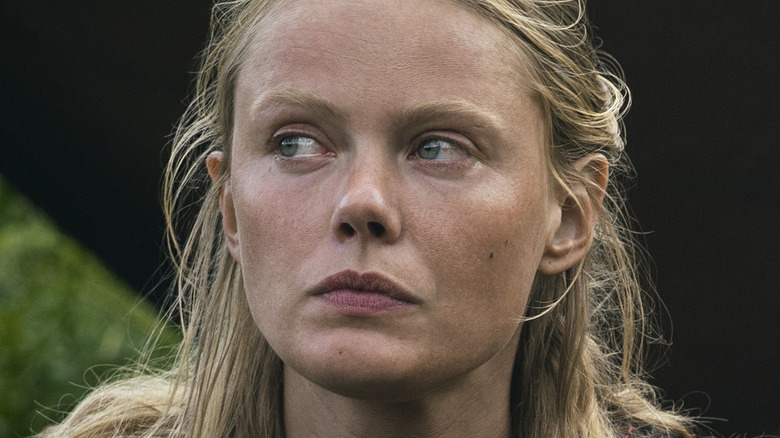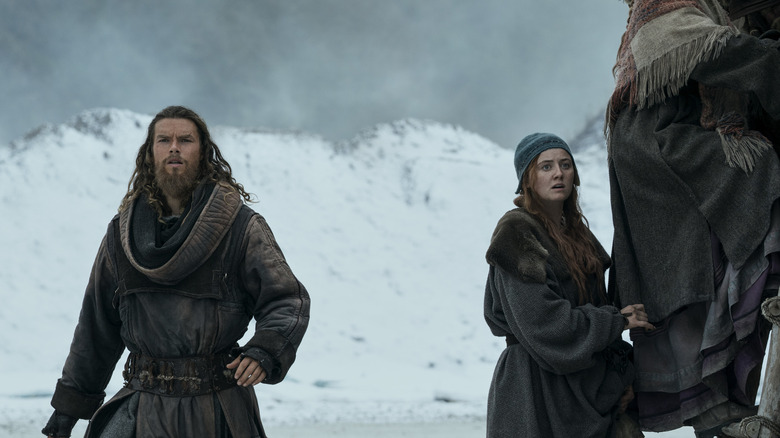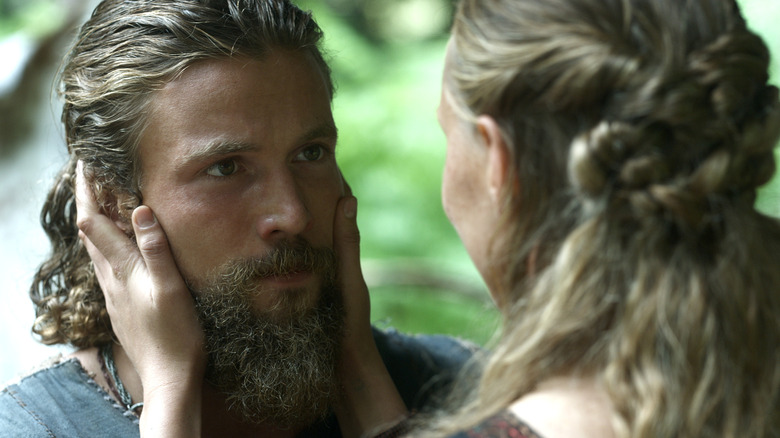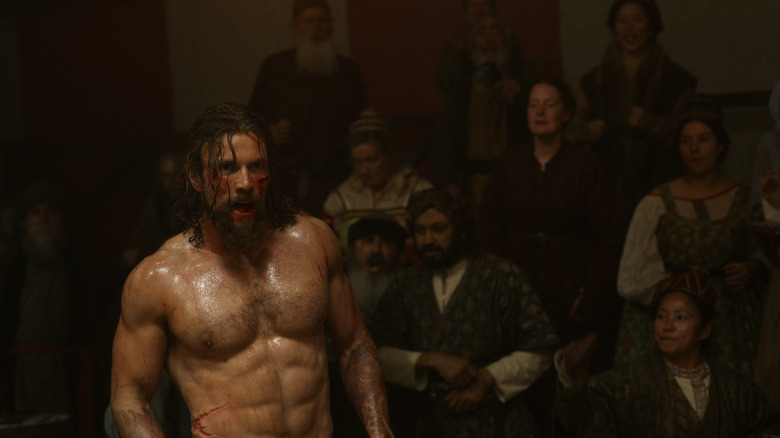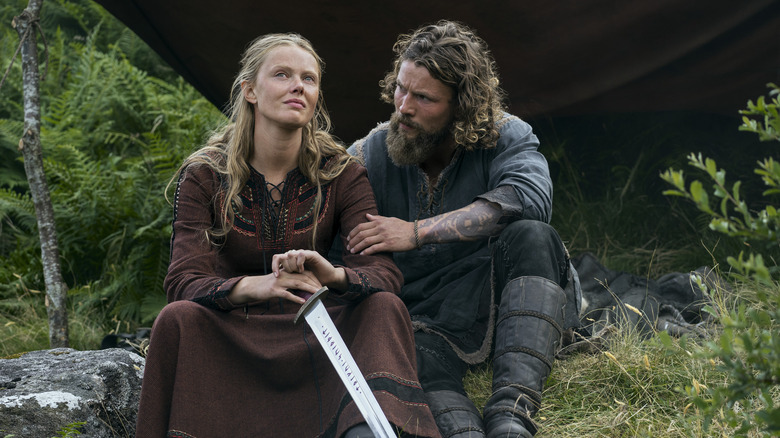Vikings: Valhalla's Sam Corlett, Frida Gustavsson, And Leo Suter Discuss Their Season 2 Character Arcs - Exclusive Interview
In a show like "Vikings: Valhalla," the characters are constantly changing and adapting to the ever-shifting circumstances of their time period. Vikings were always on the move, and Season 2 of "Vikings: Valhalla" is honing in on that facet of history. The trials of the time period aren't lost on the cast, who are very happy that they have modern amenities, like heat and air conditioning. So, while filming isn't always a walk in the park, it's easy to see how good you have it when you embody characters who lived 1,000 years ago.
Looper spoke to Sam Corlett (Leif Eriksson), Leo Suter (Harald Sigurdsson), and Frida Gustavsson (Freydis Eriksdotter) during an exclusive interview for Season 2 of "Vikings: Valhalla." They discussed the evolution of their characters from Season 1, why they welcomed the challenges of filming in extreme conditions, and how the final appearance of some of those harsh-weather scenes was the opposite of what the weather was actually like during filming.
Freydis finds hope
Sam, when we first see your character at the beginning of Season 2, it's in the aftermath of the Battle of Kattegat, but the fight doesn't seem over for him quite yet. Can you describe his mindset?
Sam Corlett: I suppose the loss of his love in Liv triggers an expression of the rage that has been held inside him for so long, and that is rightfully directed toward the people that he feels [are] the cause of that rage. He's attempting to find a sense of justice. Then [at] the start of Season 2, we see him looking for Olaf, looking for that sense of justice, but it's really the falling apart of a man. He doesn't really know what his purpose is other than that, and in reconnecting with his sister and his friend, Harald, that clarity arises.
Frida, in the show's 1st season, Freydis was on a mission of revenge. She was serious a lot of the time. But this season, we see a totally different side of her. She's finding joy in her religion and others who worship like her. What was it like for you to play this happier, more hopeful side of her?
Frida Gustavsson: It was so wonderful. It was so nice to experience that. For Freydis, the journey of Season 1, as much as I love playing it, it's an incredibly emotional heart. Every episode, there's [the] death of a loved one in the most horrific way — people being murdered because of you, entire villages being burned, seeing all of your loved ones dying in your arms. It was an incredibly heavy season.
Corlett: You got to meet Harald, I suppose.
Gustavsson: Yeah, that was awesome.
Corlett: That's a good one.
Gustavsson: Yeah. There was also love. But coming into Season 2, Harald opened the door for Freydis to accept her more vulnerable side and the warmer side. It was wonderful to lean into that this season. As much as she struggles to accept her faith and accept that she is the last, ultimately, she finds that inner peace, and it's a wonderful journey.
Eyes on the throne
Leo, Harald is really focused this season on claiming the throne of Norway.
Leo Suter: That's what he wants.
He believes that's his destiny now. How did you feel about his determination to take what he feels is rightfully his?
Suter: You're right — it's so clear, and it's such a driving force of his. The blinkers are on, and he has to get there. Over the course of the season, he assembles this ragtag crew to help get him to Constantinople, where he can become a rich man, his dreams will come true, and he can come back and claim what's his.
He's so single-minded and so headstrong, and that's great in some respects, but on the course of this journey, we're seeing the transformation of Harald Sigurdsson [into] Harald Hardrada, which is the nickname for when he was king.
One of the things he's got to learn is he's got to get the best out of people, and the team has to work together. Leif reminds him of that when things are going wrong on the river and they're trying to figure out how to cross this waterfall and avoid ice floes. Every member of that folk crew has to pull their weight, and he has to get that out of them.
Weather can be deceiving
Those scenes were harrowing. Sam and Leo, you spend so much time on the river, which looks so cold and frozen.
Suter: Looks can be deceiving. It was an Irish heat wave that summer. ... The skies [were] clear blue, and it [looked] like a crisp winter's morn, and it was completely the opposite. We were sweating buckets.
What were some of the challenges of shooting in those conditions when the environment on-screen was supposed to be the opposite?
Corlett: Often on this show, the challenges actually contribute to the expression of the characters. Whenever it's hard, it actually is a welcomed hardness for us to express the characters more truthfully.
We haven't got much to complain about in terms of the life that we are living. We can say "cut" and get a drink of water and warm up next to a heater. That didn't exist back in those times.
Anytime there was a challenge on the physical side, it was certainly a welcomed challenge, whether it be to do with the water we were jumping in ... I'm not sure if I can say, but we ended up going over a waterfall into water. We were shooting a sequence. I remember the first-aid guy watches us like a hawk because if we shiver, we have to come out, warm up, and then go back in again. So we're trying to get it done as quickly as possible.
Suter: Do you remember we got to swim on the beach?
Corlett: Yes.
Suter: At the end of the 1st episode of Season 2, we're stranded on a beach, and we've got to escape. It was the most beautiful beach. This heat wave lasted for weeks and weeks, so the heat wave [was] still going on. At the end of the day, we got a quick dip, and then we had to be bused back to Dublin.
Gustavsson: So nice.
Suter: That was [a] perk of the job. It was a warm one this time around.
Freydis taps into her inner warrior
Frida, Freydis was established as this extremely accomplished warrior last season. That's one of the things we all love about her. But in this season, she's isolated from her allies, and she has to rely on more than her fighting skills to ensure her survival. How did you understand her choices this season?
Gustavsson: Freydis — having grown up [on] the outskirts of the Viking world, she's a hunter, and coming into Kattegat last season, she's trained by Jarl Haakon to become a legendary shield-maiden. Her physicality is something that she's always relied on. Being pregnant alone in a new place, you're robbed of the possibility to fend for yourself, and that was a very vulnerable place to be in.
Relearning how to do all the fights with the prosthetics — I worked with Susan O'Connor Cave, our costume designer, to make these prosthetics the actual weight of what [they] would be at the different stages of the pregnancy — it shifts your balance, but it also gives you a very different way of fighting, where you're not only fighting for yourself but you're really protecting yourself. It's a very vulnerable season for Freydis this time around.
There [are] some fights further down the season where she's in very rough shape. She's just given birth, she's not been very well taken care of, and she's fighting with every little last ounce of energy that she has. I'm not going to say what happens, but it's beautiful to see. Just like Harald, she has to go through a journey of realizing that she can't do it all by herself. She needs to trust and believe in the people around her and surrender to that.
Suter: When I've seen your fights in the early episodes when you're pregnant with our child, I'm [like], "Whoa! Be careful!" I think you did an amazing job protecting two people, not just one.
"Vikings: Valhalla" Season 2 is now streaming on Netflix.
This interview has been edited for clarity.
